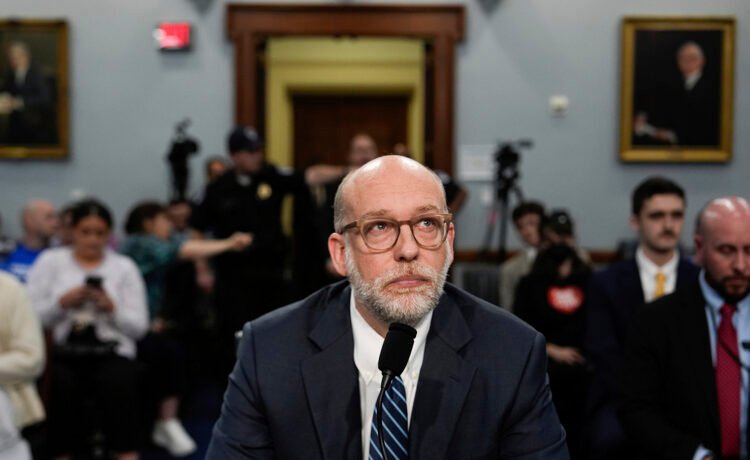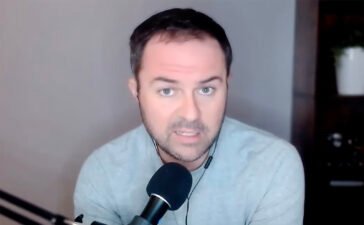WASHINGTON (RNS) — As Russell Vought, the director of the U.S. Office of Management and Budget, testified June 9 before the House Appropriations Committee, U.S. Rep. Mark Pocan, a Wisconsin Democrat, asked an unusual question — one that seemed far afield from President Trump’s “big, beautiful” budget bill, which Vought had come to Capitol Hill to discuss.
“You identify yourself as a Christian nationalist, correct?” Pocan asked, citing Google search results about Vought.
Vought responded that he is an evangelical Christian, but said he did not believe the question was pertinent. When Pocan pressed, Vought referred vaguely to “debates in the think tank world about what it means to be a Christian nation” before the two moved on.
The moment was remarkable both for its awkwardness and for what went unsaid: Vought’s reticence before lawmakers notwithstanding, the OMB director has spent years voicing passionate support for Christian nationalism.
“We are a Christian nation,” Vought said in a 2022 address to Intercessors for America, a conservative Christian group. “We talk about under God, we are a Christian nation, we were meant to be a Christian nation. We have lost that. That means that, yes, we love religious liberty, but to the extent that we don’t even have Christians that talk about how we’re a Christian nation, something’s wrong there.”
It’s part of a history of religious rhetoric that has gotten relatively little attention since Vought resumed leadership of the OMB, where he has played a subdued but significant role in what may be the largest winnowing of the U.S. government in history. As Elon Musk made headlines for shuttering USAID and laying off thousands of federal workers, Vought’s office has quietly administered mass firings in an apparent attempt to implement Project 2025, a massive policy document produced by the Heritage Foundation that Vought is credited with chiefly authoring.

A Project 2025 fan in the group’s tent at the Iowa State Fair, Aug. 14, 2023, in Des Moines, Iowa. The Project 2025 effort is being led by the Heritage Foundation think tank. (AP Photo/Charlie Neibergall)
But lost in the debate over government cuts is how Christian nationalism provides the ideological foundation for Vought’s plan to gut federal government and curtail immigration through the expansion of executive power. Or, as Vought once put it, implementing a vision for America that insists “Western civilization does not work without the underpinnings of a Judeo-Christian worldview.”
A Connecticut native, Vought graduated from Wheaton College, a prestigious evangelical Christian school in Illinois, in 1998. He came to Washington to study law at George Washington University and began his political rise as a legislative assistant for former Sen. Phil Gramm of Texas, a conservative mainstay of the Senate in the 1980s and ’90s. After years serving as a functionary on Capitol Hill, Vought joined Heritage Action, the political wing of the Heritage Foundation.
Vought did not respond to multiple interview requests for this story, but has made no secret of his suspicion that the U.S. is becoming hostile to Christianity. Nominated to be deputy budget director in Trump’s first administration in 2017, he was grilled by Sen. Bernie Sanders of Vermont at his confirmation hearing about a blog post he had written defending the firing of a Christian professor at Wheaton who had donned a hijab and said Muslims and Christians “worship the same God.”
When Sanders asked whether parts of the post were Islamophobic, Vought stood firm. “Senator, I wrote a post based on being a Christian and attending a Christian school that has a statement of faith that speaks clearly in regard to the centrality of Jesus Christ in salvation,” he said.
Vought later framed the exchange as evidence of increasing hostility toward Christians. “It was one of those early indications that the heat is turning up” on religious conservative like himself, Vought later told Intercessors for America.
Vought has said his initial plan was to do a short stint in the Trump administration before leaving to attend seminary and become a pastor. But after Trump lost to Joe Biden in 2020, Vought has said, “God had other plans.” He founded his own think tank, the Center for American Restoration, promptly renaming it the Center for Renewing America, a change he said was inspired by the New Testament’s Letter to the Romans: “Do not be conformed to this world, but be transformed by the renewal of your mind, that by testing, you may discern what is the will of God.”
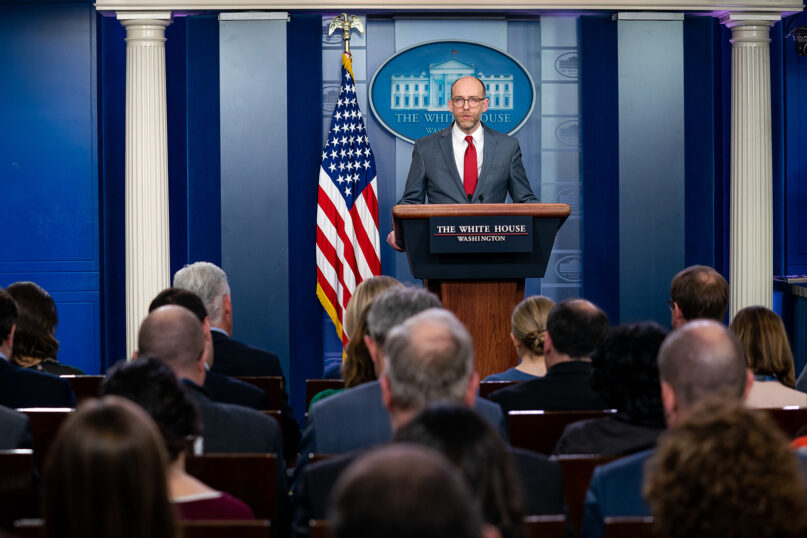
Acting Director of the Office of Management and Budget Russell Vought speaks at a press briefing Monday, March 11, 2019, in the James S. Brady Press Briefing Room of the White House. (Official White House Photo by Tia Dufour)
As a private citizen, he increased his use of religious rhetoric, taking on an apocalyptic tone out of sorts with his image as a buttoned-down bureaucrat. In May 2021 in Dayton, Ohio, he spoke to the Forge Leadership Network, a training program for young conservatives, prompting them to “examine public policy and ethics from a Judeo-Christian worldview.”
Speaking calmly but with unmistakeable passion, he laid out for the audience a vision of America in decline — a decline, he said, that has befallen the country because “as a people, we have forgotten God.” He lamented that a country “created by God-fearing men” now “denies those who share our values a place in it.”
“We don’t have culture. We don’t have the media. We don’t have the corporations,” Vought said. “In the modern era, conservatives have pretty much one single way to influence public policy and the culture: It’s through politics and governing. We must pull that lever.”
The key, he argued, was to engage in “soulcraft”: “It’s time to insist that our leaders focus on the cultural fights that they have for so long avoided.”
Meanwhile, writers at Center for Renewing America — whose fellows included Kash Patel, currently director of the FBI — railed against progressive and “postmodern” Christians who “undermine the revealed truth they claim to serve.” The group’s 2022 budget proposal opened with a reference to the Bible’s First Book of Samuel as part of an argument that “the government itself is increasingly weaponized against the people it is meant to serve.”
Vought, for his part, even blasted fellow conservatives such as New York Times columnist David French, tagging him the “Colin Kaepernick of the evangelical church.”
Christian nationalism was incorporated into his rationale for decimating the federal government. In 2022, he tweeted, “… if the question is whether Christian Nationalism beats secular globalism & whether a woke/weaponized administrative state needs to be deconstructed … the answer is emphatically yes.”
He grew bolder about promoting Christian nationalism in public appearances and behind closed doors. In a hidden-camera footage recorded by the Centre for Climate Reporting, a British nonprofit, Vought told two men posing as relatives of a wealthy conservative donor that he believes in “Christian nation-ism” and wants to “rehabilitate Christian nationalism.”
Around this time Vought was often heard using the phrase “Duty is ours; results are God’s,” an axiom quoted by Christian nationalist leaders affiliated with groups such as Wallbuilders, the organization run by activist David Barton. Vought attributed it to “the Founders” and President John Quincy Adams but, like other dictums embraced by Christian nationalists, the sourcing is dubious: Researchers at the Massachusetts Historical Society, which holds Adams family papers, told RNS they couldn’t find any instance of Adams using the phrase.
It was partly through Christian nationalism that Vought became tied to a group of deeply conservative evangelical Calvinists in the orbit of Doug Wilson, a pastor who has spent decades seeking to build a Christian nationalist community in northern Idaho and recently emerged as an influential figure in far-right intellectual circles. In an interview in February, Wilson told RNS he doesn’t know the specifics of Vought’s theology, but said, “I would guess that we’d be on a similar page.”
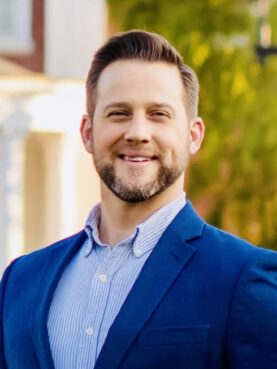
William Wolfe. (Photo courtesy Center for Baptist Leadership)
Vought is also close to William Wolfe, a promoter of Wilson’s thought. A former mid-level Trump administration official and Heritage Action staffer, Wolfe has referred to Vought as his “political mentor.” In since-deleted tweets from 2022, Wolfe said Christian nationalism is the only option to combat liberalism, posting, “You can be a Christian nationalist, or a Rainbow Flag nationalist” before adding, “Choose wisely.”
Today Wolfe heads the Center for Baptist Leadership, a project of the American Reformer, a conservative Christian outlet that has published pieces by Vought. Vought, meanwhile, boosts Wolfe’s work on social media often and has said he is “proud” to work with Wolfe “on scoping out a sound Christian Nationalism.”
Both men are immigration hardliners who see the issue in terms of Christian nationalism. “One of the main drivers of Christian opposition to Christian nationalism,” Wolfe has argued, is “Progressive Christian support for open borders.” In a livestream taped at the 2023 Iowa caucuses, Wolfe suggested that “favoring Christians in American immigration policy” is something “we should consider.”
In a 2023 speech titled the “Christian Case for Immigration Restriction,” Vought dismissed evangelicals who have voiced support for refugees and defended the first Trump administration’s family separation policy, arguing the Bible has “principles for thoughtful, limited immigration and emphasizing assimilation” and questioned whether even legal immigration is “healthy” for the U.S.
“What the nation needs more than anything,” Vought said, “is not Christians getting on their uninformed moral high horse, but Christians insistent on being responsible stewards of a blessing that has been God-given: to live in this land, this particular land.”
Wilson appeared at the same event, under the rubric “The Theology of American Statecraft,” convened by American Moment, a group that advised on Project 2025.
Later at the same event, Wilson and Vought sat together on a panel moderated by Nate Fischer, a venture capitalist who helped found both American Reformer and New Founding, which is tied to a planned Christian nationalist development in Tennessee. According to a since-deleted tweet, Wolfe was also in attendance.
Wilson and his allies grew more publicly supportive of Vought after Trump’s reelection in 2024. Speaking on Wilson’s podcast earlier this year, Joe Rigney, an associate pastor at Wilson’s church who has forwarded the idea that empathy can be a “sin,” celebrated the idea that the new director of the Office of Management and Budget is “actually going to do the things I want.”
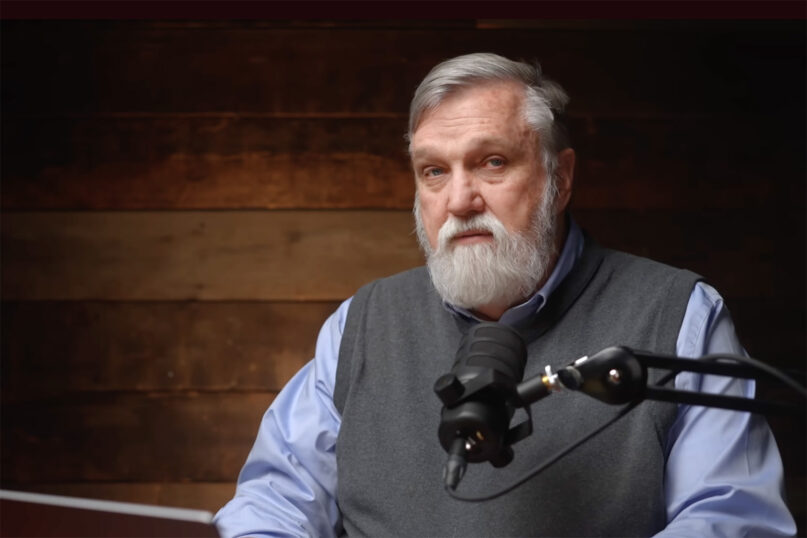
Pastor Doug Wilson of Christ Church. (Video screen grab)
Wilson recently announced a new satellite church in D.C., whose address is the same as the Conservative Partnership Institute, a far-right activist group that has extended grants to Vought’s Center for Renewing America, according to tax filings.
But even as Vought has found new allies, his leanings have alienated some conservatives — including fellow evangelicals. When Wheaton congratulated him on his confirmation as OMB director on social media, 1,800 of the school’s alumni and others signed a petition condemning the endorsement, calling Vought’s projects “antithetical to Christian charity.”
Looking to quell the controversy, Wheaton withdrew its congratulations, only to see another letter written by Eric Teetsel — a Wheaton grad who took over the Center for Renewing America after Vought left to join the administration — signed by 1,400 alumni appear as a counter-protest. The letter called for an end to the school’s “current DEI regime.”
Even some of his inspirations are challenging his ideas. In his 2021 speech to the Forge Leadership Network, Vought said his use of the term “soulcraft” was taken from conservative columnist George Will’s 1983 book “Statecraft as Soulcraft.” Will told RNS that while he agrees with the OMB director on several points, Vought misunderstands the concept. Soulcraft, Will said, is what virtually every government does by passing laws that “encourage or stigmatize or forbid certain behaviors,” whereas Vought seems to be calling on the government to engage in “conscious, explicit soulcraft.”
“Vought has a more ambitious agenda of soulcraft than I think is healthy or proper for society,” Will said.
Of Vought’s vision for Christian nationalism, Will said, “If his aspiration is a Christian nation, I’d say, ‘Good luck to you … just keep the government out of it.”

Russell Vought, President Donald Trump’s choice for director of the Office of Management and Budget, appears before the Senate Budget Committee during a hearing examining his nomination, on Capitol Hill in Washington, Jan. 22, 2025. (AP Photo/Jacquelyn Martin)
(This story was reported with support from the Stiefel Freethought Foundation.)

